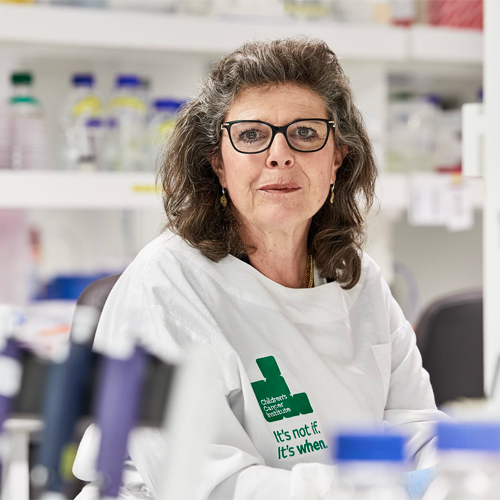Leukaemia expert elected to Academy of Science
 Cancer researcher Professor Michelle Haber has been elected as a Fellow of the prestigious Australian Academy of Science for her outstanding contribution to science.
Cancer researcher Professor Michelle Haber has been elected as a Fellow of the prestigious Australian Academy of Science for her outstanding contribution to science.
Professor Haber, Executive Director of Children’s Cancer Institute, was part of the team that developed minimal residual disease testing for children with acute lymphoblastic leukaemia.
As Head of the Experimental Therapeutics Group, her current research focuses on developing effective treatments for children with neuroblastoma, and extending these treatments to other childhood malignancies including brain tumours, leukaemias and sarcomas.
She has also driven the establishment of Australia’s first national child cancer precision medicine program Zero Childhood Cancer (ZERO).
Her research contributions have previously been honoured with, a NSW Premier’s Award for Outstanding Cancer Researcher of the Year, Membership of the Order of Australia and Fellowship of the Australian Academy of Health and Medical Sciences.
Hospitals must take responsibility for staff psychological wellbeing
Hospitals and other employers must take “proactive and meaningful steps” to care for the mental health and wellbeing of workers, a leading medical indemnity provider says.
The warning from Avant Mutual follows a decision last month by the High Court of Australia, which found in favour of a public prosecutor who sued her former employer for failing to protect her from workplace trauma.
She was ultimately awarded significant damages.
“The decision is a sad reminder to employers that they cannot adopt a ‘wait and see’ approach where the work of their employees inherently involves psychosocial hazards,” said Avant senior solicitor Frances Thomas.
She suggested employers conduct health and safety risk assessments to identify challenging situations such as encounters with violent, angry or distressed patients and extremely high workloads.
It was likely that many staff had seen their mental health impacted through COVID-19, adding to the need for workplace health and safety systems to be agile and proactive, Ms Thomas added.
“We recommend that all practices have systems in place to manage psychosocial hazards,” she said.
AMA vice president Dr Chris Moy said more protections were needed, calling on all states and territories to enact legislation making hospital boards directly and explicitly responsible for the psychosocial wellbeing of their staff.
Laws that did so were currently only in place in South Australia, he said.
Telehealth frailty assessments better for blood cancer patients
Frailty assessments for blood cancer patients are feasible by telehealth and offer more convenience than face to face assessments, according to a US study published in Blood Advances.
Clinicians at the Brigham and Women’s Hospital adapted their in-person geriatric evaluation to a virtual format to prevent unnecessary covid exposure for patients with blood cancers enrolled in the Older Adult Hematologic Malignancy Program.
They evaluated the virtual assessments in cohort of 185 patients over the age of 73, who were compared with a previous group of 876 patients 75 years of age and older who completed the exam in person.
For the virtual assessments, they found that 81% of participants successfully completed the test, and no falls or safety events were reported throughout the duration of this study.
Study investigator Dr Clark DuMontier said the study showed that that offering virtual exams could allow immunocompromised patients to safely under assessments and avoid in-person interactions. Virtual assessments would also enable researchers to monitor patient progress in the home, where measurements might be more accurate, he added.
“One challenge we encounter in hematology is that patients often come in to see us when they are at their best. So, when we see them in the clinic, they might look great, but that also might be the only day they got out of bed that week,” said Dr DuMontier.
“Being able to do these exams virtually allows us to assess patients in real time and potentially get more accurate scores. Using this assessment, we can measure frailty where it matters most, in their homes.”
The team now aims to expand access to technology, such as patient wearables and monitoring devices, and technology education so that more patients can take advantage of telehealth resources that incorporate both patient-reported and objective performance measures.